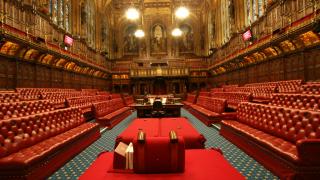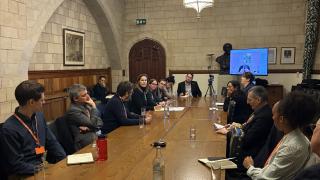
The Government has backed UNA-UK’s calls for a fairer, more inclusive process to select the next UN Secretary-General at a House of Lords debate on UN effectiveness - the first of its kind to take place in more than two decades.
Lord Dubs, who tabled the 10 September debate, thanked the United Nations Association - UK for providing a briefing on behalf of 1 for 7 Billion - a global movement co-founded by UNA-UK that campaigns for an improved process to select the UN's leader. Lord Dubs opened by acknowledging that an effective UN is vital to British interests:
“The United Nations is important to this country’s national security and prosperity and, as one of the permanent members of the Security Council, it is important that we show consistent leadership at the UN. There should be a clear strategy for British action to strengthen the organisation.”
UN APPG Vice Chair Baroness Coussins paid tribute to UNA-UK's 1 for 7 Billion campaign for rallying global support for a fairer process. She stated that:
“A more transparent, inclusive and accountable process would be more likely to produce a Secretary-General… who will rise above narrow national interests and be the kind of leader for an age of ever-more rapid globalisation"
Citing the campaign’s list of reforms - from a non-renewable single term of office to a clear set of selection criteria – Baroness Coussins echoed 1 for 7 Billion’s view that “a more open, inclusive way of appointing the Secretary-General could have ‘a transformative multiplier effect across the UN system’”. She added that improved dialogue between states and candidates would give the whole world, not just the five permanent members of the Security Council, a stake in the outcome.
Many participants called for a greater number of female candidates to be considered for the UN’s top spot with Peers suggesting the names of Gro Harlem Brundtland, Helen Clark and Baroness Amos. However, there was broad consensus for a merit-based appointment process that is geared towards securing the best candidate, irrespective of region or gender.
Representing the Government position, the Earl of Courtown described the United Nations as “an essential component within the international rules-based system”, emphasising that “it is critical that this organisation has effective leadership”. The Minister advocated a specific role for civil society in the selection process:
“[C]andidates should be provided with a platform to set out their manifestos and be questioned by Security Council and General Assembly members, as well as NGOs and civil society. This would allow for greater involvement from the wider United Nations community about issues of concern.”
This is a welcome improvement in the UK’s position, which, earlier this year, did not specify the role that UN member states and civil society should take in the selection process.
Other proposals endorsed by the Minister during the debate included a clear timeline for candidates to come forward, deadlines for the selection to take place, and a formal call for candidates to be provided by the Presidents of the General Assembly and Security Council.
The Minister concluded that the UK hopes to work with Costa Rica and Colombia on promoting support for a fairer process during the opening of the next General Assembly Ministerial Week at the end of September.
Click here to read the full debate
Photo: Copyright UK Parliament/CC






